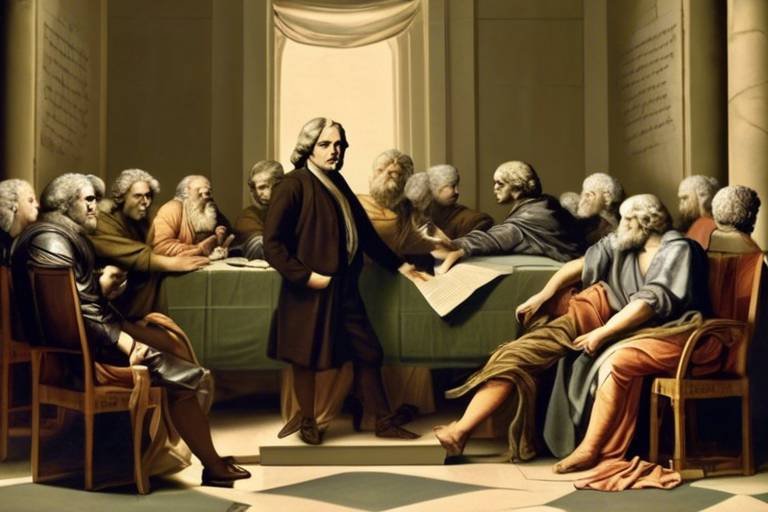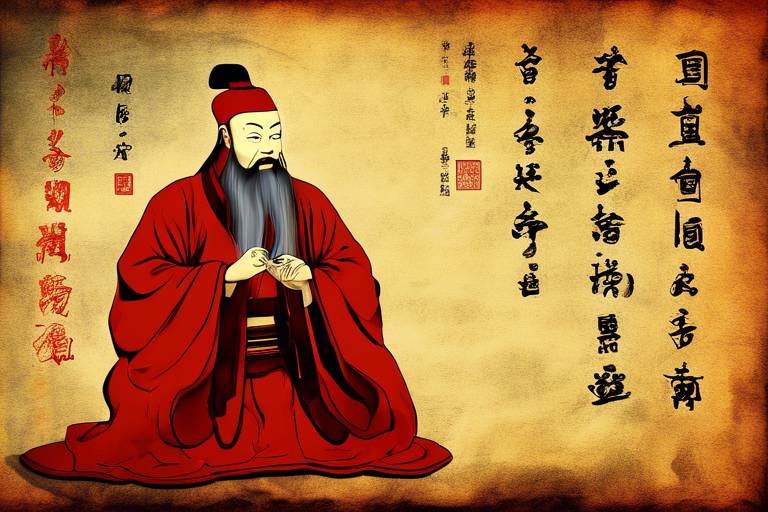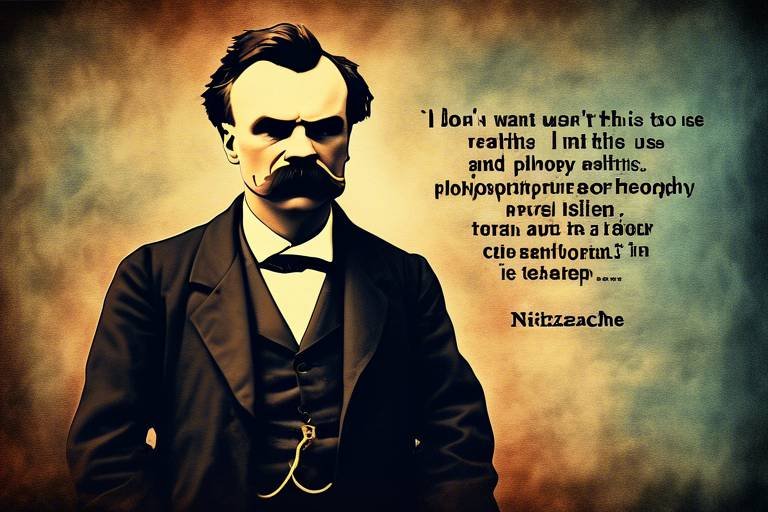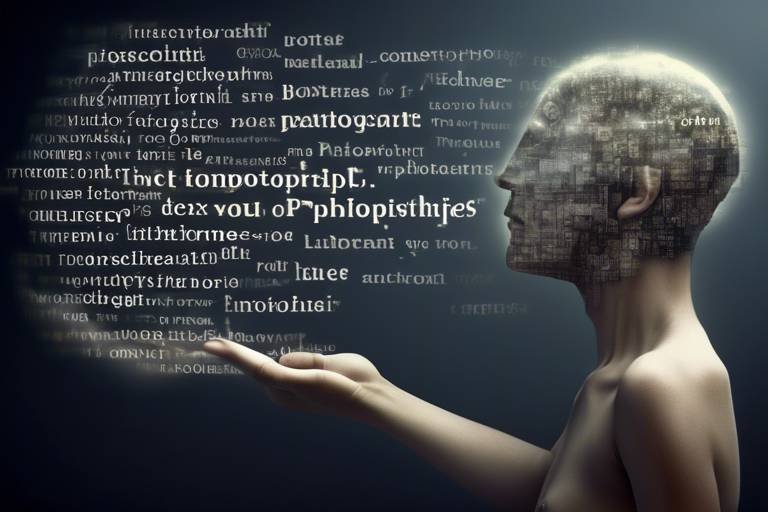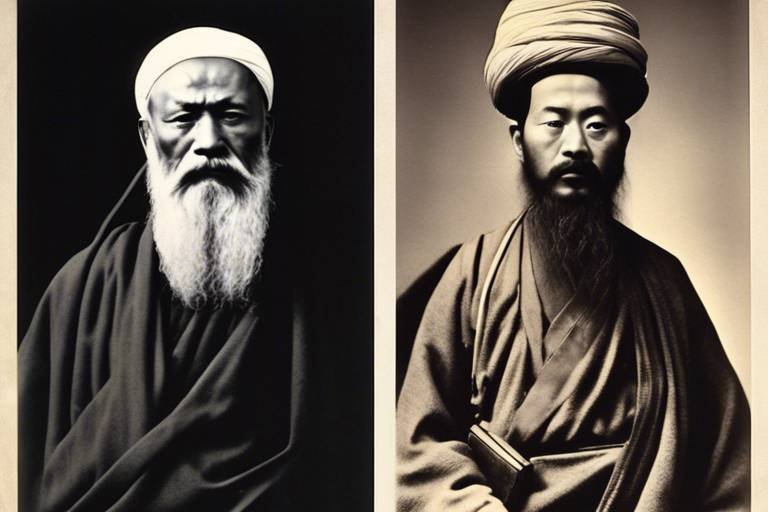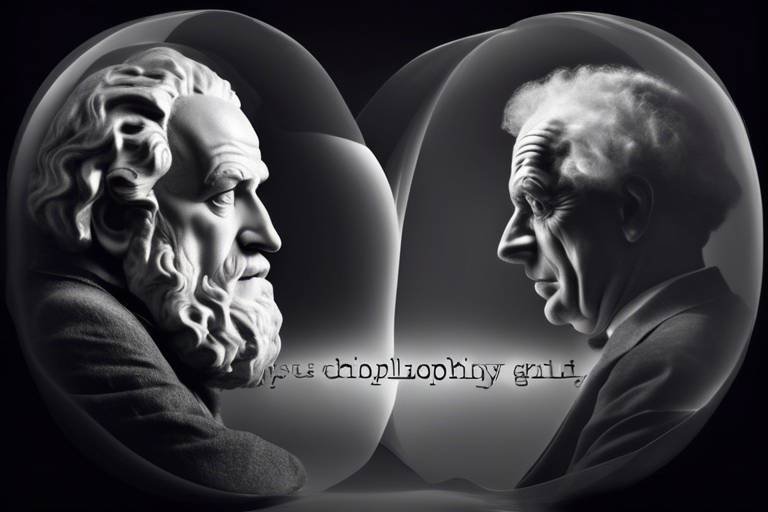Philosophy in History: How it Shapes Our Understanding
Philosophy is not just an abstract discipline; it is a powerful lens through which we can examine history and understand the world around us. Throughout the ages, philosophical ideas have intertwined with historical events, influencing how societies develop and how individuals perceive their reality. Have you ever wondered how the thoughts of ancient philosophers continue to echo in our modern lives? This article delves into the intricate dance between philosophy and history, illustrating how profound ideas have shaped our understanding of existence, ethics, and governance.
To grasp the significance of philosophy in history, we must first consider its origins. Ancient thinkers like Socrates, Plato, and Aristotle laid the groundwork for critical inquiry, challenging conventional wisdom and encouraging people to question their beliefs. These foundational ideas did not just vanish; they became the bedrock upon which modern philosophy is built. For instance, the Socratic method of dialogue is still a staple in educational settings today, fostering critical thinking and self-reflection.
Moreover, philosophical concepts have played pivotal roles in political movements throughout history. The Enlightenment era, marked by thinkers such as John Locke, Jean-Jacques Rousseau, and Voltaire, was a time when traditional authority was questioned, and the principles of reason and individual rights were championed. This period laid the groundwork for modern democratic ideals, emphasizing the importance of the individual in shaping society. Can you imagine a world where these ideas hadn’t taken root? The very fabric of our governance and rights would look drastically different.
One of the most significant contributions of Enlightenment philosophers was the social contract theory, which posited that the legitimacy of government arises from the consent of the governed. This revolutionary idea has shaped political philosophy and modern democracies, influencing how we view governance today. Furthermore, the emphasis on human rights and individualism during this period has laid the foundation for contemporary human rights movements, pushing for equality and justice on a global scale.
As we look at revolutions like the American and French, we see how deeply philosophical ideas influenced these transformative events. The cries for liberty, equality, and fraternity were not just political slogans; they were rooted in philosophical discourse that challenged the status quo. These revolutions established new political ideologies, forever altering the course of history.
Philosophy's impact extends beyond politics into the realm of science. The development of scientific thought owes much to philosophical inquiry. The debate between empiricism and rationalism has shaped how knowledge is acquired and understood. Empiricists, who emphasize observation and experience, and rationalists, who focus on reason and logic, have both contributed to the scientific method we rely on today.
Ethics in science and technology is another critical area where philosophy plays a vital role. As we navigate the complexities of modern advancements, philosophical discussions help us address moral dilemmas. For instance, questions about genetic engineering, artificial intelligence, and environmental sustainability are all grounded in ethical considerations that stem from philosophical thought.
Furthermore, cultural narratives often reflect philosophical ideas, shaping collective beliefs and values that guide societies. The intersection of mythology and philosophy illustrates how ancient stories encapsulated complex ideas, influencing cultural identities and moral frameworks. For example, myths often served as allegories for philosophical concepts, providing a narrative structure that made profound ideas more accessible.
Art and literature also reflect philosophical thought, exploring existential questions and societal critiques that resonate across time. Whether it's a novel that grapples with the meaning of life or a painting that challenges our perception of reality, these creative expressions serve as a canvas for philosophical exploration.
In contemporary times, philosophical movements continue to shape our understanding of identity, ethics, and society. Postmodernism, for instance, challenges established narratives, encouraging diverse perspectives and interpretations. This movement has significantly influenced contemporary thought and culture, prompting us to reconsider our understanding of truth and reality.
Another emerging area of focus is environmental philosophy, which emphasizes our ethical relationship with nature. As we face unprecedented environmental challenges, this philosophical lens is crucial in shaping discussions about sustainability and ecological responsibility. It pushes us to reflect on our impact on the planet and consider our obligations to future generations.
- What is the relationship between philosophy and history? Philosophy provides a framework for understanding historical events and societal developments, influencing how we interpret the past.
- How did Enlightenment thinkers influence modern democracy? Enlightenment philosophers advocated for reason, individual rights, and the social contract, which laid the foundation for democratic ideals.
- What role does philosophy play in science? Philosophy fosters critical thinking and ethical considerations, shaping scientific methodologies and addressing moral dilemmas in technology.
- How does philosophy impact culture? Cultural narratives often reflect philosophical ideas, influencing collective beliefs and values that guide societies.
- What are some modern philosophical movements? Contemporary movements like postmodernism and environmental philosophy address current challenges and redefine traditional concepts.

The Origins of Philosophical Thought
When we dive into the origins of philosophical thought, we embark on a fascinating journey that stretches back to ancient civilizations. Imagine a time when the world was filled with myths and legends, and people sought to make sense of the universe around them. Early philosophers, often referred to as the pre-Socratics, were the pioneers who dared to question the status quo. They laid the groundwork for what would become a rich tapestry of philosophical inquiry that shapes our understanding of existence, ethics, and knowledge today.
These thinkers, such as Thales, Anaximander, and Heraclitus, sought to explain the natural world through rational thought rather than relying solely on mythological explanations. For instance, Thales is often credited with proposing that water is the fundamental substance of all things, marking a significant shift towards a more scientific approach to understanding reality. This transition from mythos to logos— from myth to reason— was revolutionary and set the stage for future philosophical exploration.
As we move through history, we encounter the profound impact of Socrates, whose method of questioning—known as the Socratic Method—challenged individuals to examine their beliefs critically. Socrates believed that the unexamined life is not worth living, prompting people to reflect on their values and ethical standards. His dialogues, often conducted in public spaces, encouraged a culture of debate and inquiry that resonated deeply with his contemporaries and continues to influence educational practices today.
Following Socrates, we have his student, Plato, who took philosophical thought to new heights. In his works, such as "The Republic," Plato explored the concept of justice, the ideal state, and the role of the philosopher-king. He introduced the theory of Forms, positing that the material world is a shadow of a higher reality composed of abstract Forms or Ideas. This notion has sparked countless discussions and interpretations throughout history, influencing various fields, including metaphysics and epistemology.
Then comes Aristotle, who not only expanded on Plato’s ideas but also laid the foundations for many modern disciplines, including logic, biology, and ethics. His empirical approach to understanding the world emphasized observation and categorization, which paved the way for the scientific method. Aristotle’s writings cover a vast array of topics, and his influence can be seen in both philosophical and scientific thought, making him a central figure in the history of philosophy.
In summary, the origins of philosophical thought are deeply intertwined with the pursuit of knowledge and understanding. The early philosophers challenged existing beliefs and sought to explain the world through reason and inquiry. Their legacies continue to resonate, reminding us that philosophy is not just an abstract discipline; it is a vital part of our quest for meaning in an ever-complex world.
- What is the significance of philosophical thought?
Philosophical thought is significant because it encourages critical thinking, helps us understand our values, and provides frameworks for examining ethical dilemmas. - Who were the pre-Socratic philosophers?
The pre-Socratic philosophers were early thinkers like Thales, Anaximander, and Heraclitus who sought to explain the natural world through reason rather than mythology. - How did Socrates influence philosophy?
Socrates influenced philosophy through his method of questioning, which encouraged individuals to critically examine their beliefs and values. - What are Plato's contributions to philosophy?
Plato contributed to philosophy through his explorations of justice, the ideal state, and the theory of Forms, significantly shaping Western thought. - What role did Aristotle play in the development of philosophy?
Aristotle played a crucial role in developing various disciplines, emphasizing empirical observation and logic, which laid the groundwork for the scientific method.

Philosophy and Political Movements
Throughout history, the relationship between philosophy and political movements has been a powerful force in shaping societies. Philosophical ideas have not only inspired revolutions but have also provided the intellectual framework for the emergence of new political ideologies. When we look back at pivotal moments in history, we often find that the revolutionary fervor was fueled by philosophical thought, challenging the status quo and advocating for change.
Consider the American Revolution, where Enlightenment ideas about liberty and democracy played a crucial role. Thinkers like John Locke argued for the rights of individuals and the concept of government as a social contract. This philosophical foundation ignited a desire for independence among the colonies, leading to a break from British rule. Similarly, the French Revolution was deeply rooted in the ideas of equality, fraternity, and liberty, which were championed by philosophers such as Jean-Jacques Rousseau. These ideals not only inspired the revolutionaries but also laid the groundwork for modern concepts of democracy and human rights.
Philosophy's influence on political movements can be categorized into several key areas:
- Legitimacy of Governance: The social contract theory, proposed by philosophers like Rousseau, emphasized that a government's legitimacy comes from the consent of the governed. This idea has been pivotal in shaping democratic systems around the world.
- Human Rights: Enlightenment thought sparked a focus on individual rights, which has become a cornerstone of contemporary human rights movements. Philosophers like Voltaire advocated for freedom of speech and religion, ideals that resonate strongly in today's political discourse.
- Political Ideologies: The emergence of various political ideologies, such as liberalism, socialism, and feminism, can be traced back to philosophical debates. Each ideology reflects different philosophical beliefs about human nature, society, and governance.
Moreover, the impact of philosophical thought extends beyond mere ideas; it manifests in the actions of individuals and groups who rally around these concepts. For instance, the civil rights movement in the United States drew heavily from philosophical arguments about equality and justice, echoing the sentiments of past thinkers. Activists like Martin Luther King Jr. employed philosophical rhetoric to advocate for change, demonstrating how philosophy can mobilize people to fight for their rights.
In summary, the interplay between philosophy and political movements is a testament to the power of ideas. Philosophical thought has the ability to inspire, challenge, and transform societies, shaping the political landscapes we navigate today. As we continue to face global challenges, the lessons drawn from historical philosophical movements remain relevant, urging us to reflect on the ethical implications of governance and the rights of individuals within society.
- How does philosophy influence political ideologies? Philosophy provides the foundational ideas that shape political ideologies, influencing beliefs about governance, rights, and justice.
- Can you give examples of philosophers who impacted political movements? Yes, philosophers like John Locke, Jean-Jacques Rousseau, and Voltaire significantly influenced movements such as the American and French Revolutions.
- What is the social contract theory? The social contract theory posits that the legitimacy of government stems from the consent of the governed, a concept that has shaped modern democratic thought.

Influence of Enlightenment Thinkers
The Enlightenment era, often referred to as the Age of Reason, marked a pivotal moment in history where philosophical thought began to challenge the status quo. Thinkers such as John Locke, Jean-Jacques Rousseau, and Voltaire emerged as titans of intellectual thought, advocating for principles that would lay the groundwork for modern democratic ideals. Their ideas were not just abstract theories; they ignited a fire of change that swept across Europe and beyond, influencing political revolutions and societal transformations.
Locke's assertion that individuals possess natural rights to life, liberty, and property fundamentally altered the way people viewed governance. He argued that governments exist to protect these rights, and if they fail to do so, the people have the right to overthrow them. This idea was revolutionary, encouraging citizens to question authority and demand accountability. Rousseau, on the other hand, introduced the concept of the social contract, suggesting that legitimate political authority rests on the consent of the governed. This idea became a cornerstone for modern democratic thought and is still relevant in discussions about government legitimacy today.
Voltaire, with his sharp wit and critique of religious and political institutions, championed the importance of freedom of speech and expression. He famously stated, “I disapprove of what you say, but I will defend to the death your right to say it.” This advocacy for individual rights and personal freedoms resonated deeply, inspiring movements that sought to establish civil liberties and human rights across the globe.
The Enlightenment thinkers collectively challenged the traditional hierarchies of their time, advocating for reason and individualism over blind faith and authoritarianism. They believed that through reason, humanity could achieve progress and enlightenment. This philosophical revolution not only shaped political landscapes but also influenced cultural narratives, encouraging a spirit of inquiry and skepticism that continues to thrive in contemporary discussions about ethics, governance, and social justice.
In summary, the Enlightenment thinkers were not merely philosophers; they were architects of modern thought. Their ideas about governance, rights, and social contracts have profoundly influenced our understanding of democracy and individual freedoms. As we navigate through today's complex societal challenges, reflecting on their contributions offers valuable insights into our ongoing quest for justice and equality.
- What was the main idea of Enlightenment thinkers? Enlightenment thinkers emphasized reason, individual rights, and the importance of questioning authority, which laid the foundation for modern democratic principles.
- How did Enlightenment ideas influence revolutions? The ideas of Enlightenment philosophers inspired revolutionary movements by advocating for the rights of individuals and the legitimacy of government based on the consent of the governed.
- Who were the key figures of the Enlightenment? Key figures included John Locke, Jean-Jacques Rousseau, and Voltaire, each contributing unique ideas that shaped political and philosophical thought.
- What is the social contract theory? The social contract theory posits that governments derive their authority from the consent of the governed, and individuals have the right to challenge or overthrow governments that fail to protect their rights.

Social Contract Theory
The is one of those profound philosophical concepts that fundamentally reshaped our understanding of governance and societal structure. Imagine a world where individuals willingly come together to form a society, agreeing to abide by certain rules for the greater good. This idea, which has roots in the works of philosophers like Thomas Hobbes, John Locke, and Jean-Jacques Rousseau, posits that the legitimacy of government arises from the consent of the governed. In other words, people agree to give up some of their freedoms in exchange for protection and the benefits of living in a structured society. It's like trading a bit of your independence for a ticket to a safer, more organized amusement park of life!
Hobbes, in his book Leviathan, painted a rather grim picture of life in a state of nature, where life was "solitary, poor, nasty, brutish, and short." He argued that to escape such chaos, individuals must surrender their rights to a sovereign authority, which would maintain peace and order. On the contrary, Locke had a more optimistic view, believing that people are inherently reasonable and capable of self-governance. He emphasized that the social contract should protect individual rights—life, liberty, and property—serving as a foundation for modern democratic ideals.
Rousseau took this a step further, advocating for a social contract that reflects the general will of the people. He argued that true freedom is found in obedience to a law that one has prescribed for oneself, suggesting that individuals can achieve a collective identity while maintaining personal freedom. This perspective is crucial in understanding the evolution of democratic principles and the ongoing dialogue about the role of government in our lives.
To put it simply, the social contract can be visualized as a giant handshake among individuals, agreeing to cooperate and abide by shared rules for mutual benefit. This concept has not only influenced political philosophy but has also sparked numerous revolutions and movements throughout history. It has paved the way for discussions around human rights, individualism, and the responsibilities of government towards its citizens.
In contemporary society, the implications of the social contract theory continue to resonate. Issues such as citizenship, social justice, and government accountability are all framed within this philosophical discourse. It raises essential questions: What are our obligations to one another? How do we ensure that our government remains a true reflection of the will of the people? The answers to these questions are crucial for the health of any democracy.
In summary, the social contract theory is not just a relic of philosophical history; it is a living, breathing framework that informs our understanding of society and governance today. It challenges us to reflect on the agreements we make with each other and the structures we create to ensure a just and equitable society.
- What is the social contract theory?
The social contract theory is a philosophical concept that explores the legitimacy of government and societal structures based on the consent of the governed.
- Who are the main philosophers associated with social contract theory?
Key figures include Thomas Hobbes, John Locke, and Jean-Jacques Rousseau, each contributing unique perspectives on the nature of society and governance.
- How does social contract theory relate to modern democracy?
It provides a framework for understanding individual rights, government responsibilities, and the importance of citizen consent in democratic systems.
- Can social contract theory apply to contemporary issues?
Yes, it remains relevant in discussions about social justice, citizenship, and the accountability of governments to their citizens.

Human Rights and Individualism
The emergence of human rights as a central theme in political philosophy marks a significant evolution in our understanding of individualism. This shift began during the Enlightenment, when thinkers like John Locke and Jean-Jacques Rousseau argued that every person possesses inherent rights simply by being human. These ideas laid the groundwork for modern democratic societies, emphasizing that individual rights should be protected from the whims of authority. Imagine a world where your rights are not just privileges granted by a ruler but are recognized as fundamental to your existence—this is the essence of individualism that these philosophers championed.
In practical terms, the notion of human rights has transformed the way we view governance and justice. It posits that governments exist to serve the people, not the other way around. This idea can be encapsulated in the phrase, "consent of the governed," which suggests that individuals have the right to participate in the decision-making processes that affect their lives. The Universal Declaration of Human Rights, adopted by the United Nations in 1948, is a testament to this shift, codifying the rights that every individual should enjoy regardless of nationality, ethnicity, or religion.
Moreover, the concept of individualism extends beyond mere political rights; it encompasses the idea of personal freedom and self-expression. In a society that values individualism, people are encouraged to pursue their own paths, make choices, and express their beliefs without fear of repression. This is particularly important in the realms of art, literature, and culture, where the unique perspectives of individuals contribute to a richer, more diverse societal tapestry.
However, this emphasis on individual rights can sometimes lead to tension within communities. While individualism celebrates personal freedom, it can also challenge collective values and social cohesion. Striking a balance between respecting individual rights and fostering a sense of community is an ongoing struggle in modern societies. For instance, debates surrounding issues like freedom of speech, religious expression, and social justice often reflect this tension. The key question remains: how do we honor individual rights while ensuring that the fabric of society remains intact?
To illustrate the impact of human rights and individualism on contemporary society, consider the following table that outlines key milestones in the development of human rights:
| Year | Milestone |
|---|---|
| 1215 | Magna Carta signed, limiting the power of the king and establishing certain legal rights. |
| 1776 | Declaration of Independence in the United States, asserting the right to life, liberty, and the pursuit of happiness. |
| 1789 | Declaration of the Rights of Man and of the Citizen during the French Revolution, promoting individual liberty and equality. |
| 1948 | Universal Declaration of Human Rights adopted by the United Nations, outlining fundamental human rights for all. |
As we navigate the complexities of modern life, the interplay between human rights and individualism remains a vital conversation. It challenges us to consider how we can promote personal freedoms while also nurturing a community that respects and uplifts every member. In doing so, we not only honor the legacy of Enlightenment thinkers but also pave the way for a future where individual rights are universally recognized and celebrated.
- What are human rights? Human rights are basic rights and freedoms that belong to all individuals, regardless of nationality, sex, ethnicity, or religion.
- Why is individualism important? Individualism is important because it promotes personal freedom, self-expression, and the idea that individuals have the right to make choices about their own lives.
- How do human rights relate to democracy? Human rights are foundational to democracy, as they ensure that individuals have a voice in governance and that their rights are protected from abuse.
- Can individual rights conflict with community values? Yes, there can be tensions between individual rights and community values, leading to debates about freedom of expression, social justice, and collective responsibility.

Philosophy in Revolutionary Contexts
Revolutions are often seen as pivotal moments in history, where the tides of change sweep away the old and usher in the new. But what fuels these seismic shifts? At the heart of many revolutions lies a rich tapestry of philosophical ideas that challenge the status quo and inspire individuals to envision a different world. Think about it: when people feel oppressed or unheard, they often turn to philosophy as a guiding light, a beacon that illuminates the path to freedom and justice.
Take, for example, the American Revolution. It wasn't merely a revolt against British rule; it was deeply rooted in Enlightenment thought. Philosophers like John Locke championed the idea of natural rights—life, liberty, and property. This concept resonated with the colonists, who began to see themselves not just as subjects of a monarchy, but as individuals entitled to certain inalienable rights. The Declaration of Independence, a revolutionary document in its own right, echoed these philosophical underpinnings, declaring that governments derive their just powers from the consent of the governed. This was a radical idea at the time, suggesting that authority is not inherent but granted by the people.
Similarly, the French Revolution was fueled by the writings of philosophers such as Rousseau and Voltaire. The call for equality and fraternity was not just a cry for social change but a philosophical stance that questioned the very fabric of societal hierarchy. Rousseau's idea of the "general will" pushed the notion that true sovereignty lies with the people, a concept that would reshape governance in France and beyond. The revolutionaries were not merely seeking to overthrow a king; they were in pursuit of a philosophical ideal that emphasized the importance of collective well-being over individual privilege.
These revolutionary contexts illustrate how philosophy acts as a catalyst for change. It provides a framework for understanding injustice and inspires action. When people engage with philosophical ideas, they often find the courage to stand up against oppression, leading to movements that can alter the course of history. This interplay between philosophy and revolution is not just historical; it continues to resonate in modern movements worldwide, where individuals draw upon philosophical principles to advocate for social justice, human rights, and democratic governance.
In essence, revolutions are not just political upheavals; they are philosophical awakenings. They challenge us to reconsider our beliefs, to question authority, and to strive for a society that reflects our highest ideals. As we reflect on the past, we can see that the power of philosophy in revolutionary contexts is not merely about ideas; it is about the profound impact those ideas can have on the world.
- How does philosophy influence revolutions?
Philosophy provides the ideological foundation for revolutions, inspiring individuals to challenge existing power structures and advocate for change. - What role did Enlightenment thinkers play in revolutions?
Enlightenment thinkers introduced concepts like natural rights and social contracts, which became crucial in shaping revolutionary ideals. - Can modern movements still be influenced by philosophical ideas?
Absolutely! Contemporary movements often draw from philosophical principles to address issues like social justice, equality, and human rights. - What is the connection between philosophy and political ideologies?
Philosophy shapes political ideologies by providing the ethical and moral frameworks that guide governance and societal norms.

Philosophy's Role in Scientific Development
When we think about the evolution of science, it's easy to get lost in the whirlwind of discoveries, inventions, and breakthroughs. Yet, lurking behind every significant scientific advancement is a rich tapestry of philosophical inquiry that has shaped our understanding of the universe. Philosophy is not just an abstract discipline; it is the very bedrock upon which scientific thought is built. It encourages us to ask the hard questions: What is knowledge? How do we know what we know? And what ethical responsibilities do we have as we push the boundaries of human understanding?
One of the most pivotal contributions of philosophy to science is the establishment of critical thinking and skepticism. Philosophers like Socrates and Aristotle laid the groundwork for a method of inquiry that values questioning over blind acceptance. This method became the cornerstone of the scientific method, which emphasizes observation, experimentation, and the testing of hypotheses. For instance, the Socratic method encourages dialogue and debate, fostering an environment where ideas can be rigorously examined and refined.
The debate between empiricism and rationalism has also played a crucial role in shaping scientific methodologies. Empiricists, such as John Locke, argue that knowledge comes primarily from sensory experience. In contrast, rationalists, like René Descartes, believe that reason and innate ideas are the primary sources of knowledge. This philosophical dichotomy has influenced how scientists approach their work, leading to various methodologies that prioritize different ways of knowing.
Moreover, the ethical implications of scientific advancements cannot be overlooked. As we venture further into realms like genetic engineering and artificial intelligence, philosophical discussions surrounding ethics become increasingly vital. Questions arise: Should we edit human genes? What are the implications of creating sentient machines? These inquiries are not merely academic; they have real-world consequences that can shape laws, regulations, and societal norms.
To illustrate the relationship between philosophy and scientific development, consider the following table that summarizes key philosophical movements and their contributions to science:
| Philosophical Movement | Key Contributions to Science |
|---|---|
| Empiricism | Emphasizes observation and experimentation as the basis for knowledge. |
| Rationalism | Stresses the role of reason and innate ideas in the acquisition of knowledge. |
| Positivism | Advocates for the use of scientific methods to study social phenomena. |
| Ethical Philosophy | Addresses moral dilemmas arising from scientific advancements, shaping regulations. |
In conclusion, philosophy is not just an accessory to science; it is an integral part of its development. The interplay between philosophical thought and scientific inquiry allows us to explore not only the mechanics of the universe but also the moral implications of our discoveries. As we navigate through the complexities of modern science, it becomes increasingly clear that philosophy will continue to guide us in understanding our place in the cosmos and our responsibilities toward one another and the world around us.
- How does philosophy influence scientific methods? Philosophy encourages critical thinking and skepticism, which are essential for the scientific method.
- What are some examples of philosophical movements that shaped science? Movements like empiricism and rationalism have significantly influenced scientific methodologies and approaches.
- Why is ethics important in scientific development? As science advances, ethical considerations become crucial to ensure that discoveries are used responsibly and for the benefit of society.

Empiricism and Rationalism
When we dive deep into the realms of philosophy, two foundational concepts emerge as titans of thought: empiricism and rationalism. These two schools of thought have been at the heart of philosophical debates for centuries, shaping how we understand knowledge, reality, and our very existence. But what exactly do these terms mean, and why do they matter?
At its core, empiricism posits that knowledge comes primarily from sensory experience. Think of it as the philosophy that insists on the importance of observation and experimentation. Imagine you're a detective trying to solve a mystery. You wouldn't rely solely on your hunches or gut feelings; instead, you'd gather clues, examine evidence, and draw conclusions based on what you can see and measure. Famous empiricists like John Locke and David Hume argued that all knowledge is derived from experience, emphasizing the role of the senses in shaping our understanding of the world.
On the flip side, we have rationalism, which champions reason and innate knowledge as the primary sources of understanding. Rationalists like René Descartes and Immanuel Kant believed that certain truths exist independently of our sensory experiences. They argued that our ability to think critically, analyze logically, and deduce conclusions is what leads us to true knowledge. Imagine trying to solve a complex math problem. You don’t need to go out and measure things in the real world; instead, you rely on established principles and logical reasoning to arrive at the answer.
The clash between these philosophies can be likened to a tug-of-war. On one side, empiricists argue that without evidence gathered through our senses, we can’t claim to know anything. On the other side, rationalists assert that some truths are self-evident and can be understood through reason alone. This debate has profound implications for various fields, including science, ethics, and even politics.
| Aspect | Empiricism | Rationalism |
|---|---|---|
| Source of Knowledge | Experience and Observation | Reason and Innate Ideas |
| Key Thinkers | John Locke, David Hume | René Descartes, Immanuel Kant |
| Methodology | Scientific Approach | Logical Deduction |
| Example | Conducting Experiments | Mathematical Proofs |
This rich interplay between empiricism and rationalism has led to significant advancements in our understanding of the world. For instance, in the realm of science, the empirical method—characterized by observation, experimentation, and evidence—has been foundational in developing theories that explain natural phenomena. However, the rationalist approach has also contributed to the formation of scientific laws and principles that guide inquiry and experimentation.
As we navigate the complexities of modern life, the influence of both empiricism and rationalism continues to shape our thinking. Whether we are discussing the latest technological advancements, ethical dilemmas, or political ideologies, understanding these philosophical underpinnings helps us critically analyze the information we encounter. In a world overflowing with data, the balance between what we can observe and what we can reason becomes increasingly vital.
- What is the main difference between empiricism and rationalism?
Empiricism emphasizes knowledge through sensory experience, while rationalism focuses on reason and innate ideas as the primary sources of knowledge. - Who are some key figures in empiricism?
Notable empiricists include John Locke and David Hume. - Can empiricism and rationalism coexist?
Yes, many modern thinkers incorporate elements of both philosophies to form a more comprehensive understanding of knowledge. - How do these philosophies impact modern science?
Empiricism has led to the development of the scientific method, while rationalism has influenced theoretical frameworks that guide scientific inquiry.

Ethics in Science and Technology
The rapid advancement of science and technology has brought about incredible benefits, but it has also raised significant ethical questions that society must grapple with. As we stand on the brink of breakthroughs in fields like artificial intelligence, genetic engineering, and biotechnology, we find ourselves asking: What responsibilities do we have? How do we ensure that our innovations serve humanity without compromising our moral values?
Ethics in science is not just a theoretical concern; it is a practical necessity. For instance, consider the implications of genetic editing technologies such as CRISPR. While these tools hold the potential to eliminate hereditary diseases, they also pose risks of unintended consequences and ethical dilemmas regarding designer babies. Should we have the right to alter human DNA? And if so, who decides what constitutes a "desirable" trait?
Moreover, the rise of artificial intelligence presents its own set of ethical challenges. As machines become more autonomous, we must question their decision-making processes and the biases that may be embedded in their algorithms. This brings us to the concept of algorithmic accountability. Developers and organizations must take responsibility for the outcomes of their AI systems, ensuring they do not perpetuate discrimination or infringe on individual rights.
To navigate these complex ethical landscapes, many organizations and institutions have begun to implement ethical guidelines and frameworks. These frameworks aim to foster a culture of responsibility among scientists and technologists, encouraging them to consider the broader impacts of their work. For example, the Helsinki Declaration outlines ethical principles for medical research involving human subjects, emphasizing informed consent and the welfare of participants.
Additionally, interdisciplinary dialogue is crucial in addressing ethical concerns. Scientists, ethicists, policymakers, and the public must engage in open discussions to ensure that technological advancements align with societal values. This collaborative approach helps to create a more informed and conscientious society that can responsibly harness the power of science and technology.
In summary, the intersection of ethics, science, and technology is an ever-evolving landscape that demands our attention. As we continue to innovate, we must remain vigilant and proactive in addressing the ethical implications of our advancements. By fostering a culture of responsibility and encouraging interdisciplinary collaboration, we can ensure that the benefits of science and technology are realized without compromising our ethical standards.
- What is the importance of ethics in science and technology?
Ethics ensures that scientific advancements are made responsibly, considering their impact on society and individuals. - How do we address ethical dilemmas in AI?
By implementing guidelines for algorithmic accountability and fostering interdisciplinary dialogue among stakeholders. - What role does public opinion play in scientific ethics?
Public opinion is crucial as it influences policy decisions and helps shape ethical standards in scientific research. - Can ethical frameworks change over time?
Yes, ethical frameworks can evolve as societal values shift and new technologies emerge.

Philosophy and Cultural Narratives
The relationship between philosophy and cultural narratives is a fascinating tapestry woven through the ages, reflecting the beliefs, values, and moral frameworks of societies. At its core, philosophy serves as the lens through which we interpret our existence and the world around us. Cultural narratives, in turn, are the stories we tell ourselves—myths, legends, and folklore—that encapsulate these philosophical ideas. This interplay shapes not only our understanding of history but also our identity as individuals and communities.
For instance, consider how ancient civilizations used mythology to convey profound philosophical concepts. Myths were not merely entertaining tales; they were vehicles for exploring questions about existence, morality, and the nature of the divine. Take, for example, the Greek myth of Prometheus, who defied the gods to bring fire to humanity. This story raises ethical questions about knowledge and responsibility, illustrating how cultural narratives can echo philosophical dilemmas. Such narratives often serve dual purposes: they entertain and educate, providing a framework for understanding complex ideas.
Moreover, the impact of philosophy on cultural narratives extends beyond ancient myths. In literature, we see authors grappling with existential questions and societal critiques, reflecting the philosophical movements of their time. The works of Fyodor Dostoevsky, for instance, delve deep into the human psyche, exploring themes of free will, morality, and the search for meaning. His characters often embody philosophical struggles, making the reader confront their own beliefs and values. Similarly, modern authors like Toni Morrison use narrative to challenge prevailing cultural norms, inviting readers to reflect on issues of race, identity, and justice.
In the realm of art, philosophy continues to influence cultural narratives. Artists often draw upon philosophical themes to provoke thought and evoke emotion. The Surrealist movement, for example, was heavily influenced by Freudian theories of the subconscious, leading to works that challenge our perception of reality. Through their art, these creators invite us to question our understanding of existence and the nature of truth.
To illustrate the connection between philosophy and cultural narratives, consider the following table that highlights key philosophical ideas alongside their corresponding cultural narratives:
| Philosophical Idea | Cultural Narrative |
|---|---|
| Existentialism | The Stranger by Albert Camus |
| Utilitarianism | The Greater Good in various fables |
| Social Contract Theory | The Allegory of the Cave by Plato |
| Humanism | Renaissance Art and Literature |
Ultimately, the dialogue between philosophy and cultural narratives is an ongoing conversation that evolves with time. As we face contemporary challenges—be it in technology, ethics, or the environment—our cultural narratives will undoubtedly adapt, reflecting new philosophical inquiries. This dynamic relationship not only enriches our understanding of history but also shapes our future, reminding us that the stories we tell are as important as the ideas we ponder.
- How does philosophy influence cultural narratives? Philosophy provides the foundational ideas that shape the stories we tell, guiding our understanding of morality, existence, and identity.
- Can cultural narratives change philosophical thought? Yes, cultural narratives often reflect societal values and can challenge or reinforce philosophical ideas, leading to new interpretations and movements.
- What is the role of mythology in philosophy? Mythology serves as a means to explore complex philosophical concepts, offering narratives that encapsulate moral and existential questions.

Mythology and Philosophy
Mythology and philosophy are like two sides of the same coin; they both explore the nature of existence, human experience, and the universe, albeit from different angles. While mythology often provides a narrative framework filled with gods, heroes, and fantastical elements, philosophy digs deeper, seeking to understand the underlying truths and principles that govern our reality. This interplay between the two has shaped cultures and societies throughout history, offering insights into moral values, existential questions, and the human condition.
Take, for instance, the ancient Greeks. Their myths were not just stories to entertain; they were rich with philosophical concepts. The tales of gods like Zeus and Athena encapsulated ideas about power, justice, and morality. Philosophers such as Plato and Aristotle drew from these myths to formulate their own theories about the world. Plato famously used the allegory of the cave to illustrate the difference between the shadows of reality and the true form of knowledge, echoing the mythical themes of enlightenment and ignorance.
Moreover, mythology often serves as a vehicle for philosophical ideas to be transmitted across generations. For example, the Hindu epic, the Mahabharata, is not just a story of war and rivalry; it is a profound exploration of dharma (duty/righteousness), ethics, and the complexities of human relationships. This intersection of mythology and philosophy highlights how ancient narratives can provide a framework for ethical decision-making and understanding one's place in the world.
In contemporary times, this relationship continues to thrive. Many modern philosophers draw inspiration from mythological themes to address current issues. For example, the concept of the "hero's journey," popularized by Joseph Campbell, illustrates how mythological narratives can inform our understanding of personal growth and transformation. This journey resonates deeply within us, reflecting our struggles and triumphs in the pursuit of meaning.
To illustrate this connection further, consider the following table that contrasts key elements of mythology and philosophy:
| Aspect | Mythology | Philosophy |
|---|---|---|
| Nature | Narrative-driven | Conceptual and analytical |
| Purpose | Explain the unexplainable | Seek truth and knowledge |
| Characters | Gods, heroes, and mythical beings | Philosophers and thinkers |
| Approach | Symbolic and allegorical | Logical and rational |
In conclusion, the dialogue between mythology and philosophy enriches our understanding of both realms. By examining myths through a philosophical lens, we can uncover deeper meanings and insights about our lives and the world around us. This synergy not only enhances our cultural narratives but also invites us to reflect on our values, beliefs, and the very essence of what it means to be human.
- How do mythology and philosophy influence each other?
Mythology provides narratives that can illustrate and embody philosophical concepts, while philosophy can critique and analyze the moral and existential questions raised in myths. - Can modern philosophy still draw from ancient myths?
Absolutely! Many contemporary philosophers reference ancient myths to explore modern issues, using these narratives as frameworks for understanding personal and societal challenges. - What is an example of a philosophical idea rooted in mythology?
The concept of the hero’s journey, as discussed by Joseph Campbell, illustrates how mythological narratives reflect personal growth and transformation, which are central themes in many philosophical discussions.

Philosophy in Art and Literature
Art and literature have always served as profound reflections of philosophical thought, acting as mirrors that capture the complexities of human existence. When we delve into the realms of creativity, we often uncover layers of meaning that reveal the philosophical underpinnings that shape our understanding of life, ethics, and society. Just think about it: every brushstroke on a canvas or every word in a novel can encapsulate deep existential questions. What does it mean to be human? What is the nature of reality? These inquiries are not just academic; they resonate with the very fabric of our lives.
Consider the works of great authors and artists throughout history. From Socrates to Shakespeare, and from Van Gogh to Frida Kahlo, each has contributed to the philosophical discourse through their art. For instance, Shakespeare's plays often grapple with themes of morality, power, and the human condition, prompting audiences to reflect on their own lives and choices. Similarly, Van Gogh's vibrant paintings express emotional depth and a unique perspective on the world, inviting viewers to ponder the nature of beauty and suffering.
Moreover, the philosophical movement of existentialism has had a significant influence on literature and art, challenging individuals to confront their own existence and the absurdity of life. Writers like Jean-Paul Sartre and Albert Camus explore the idea that life lacks inherent meaning, compelling readers to create their own purpose. This existential crisis is vividly portrayed in literature, where characters often embark on journeys of self-discovery, grappling with their identity and the choices they make.
In contemporary times, the intersection of philosophy and art continues to thrive. Many artists and writers engage with pressing social issues, such as identity, gender, and race, using their platforms to challenge societal norms and provoke thought. For example, the works of authors like Toni Morrison and Chimamanda Ngozi Adichie not only tell powerful stories but also delve into the philosophical implications of race and culture, urging readers to reflect on their own beliefs and biases.
To further illustrate the relationship between philosophy and art, we can look at some notable philosophical movements and their artistic counterparts:
| Philosophical Movement | Key Themes | Influential Artists/Writers |
|---|---|---|
| Romanticism | Emotion, Nature, Individualism | William Wordsworth, Caspar David Friedrich |
| Modernism | Fragmentation, Alienation, Subjectivity | James Joyce, Virginia Woolf |
| Postmodernism | Irony, Playfulness, Relativism | Thomas Pynchon, Andy Warhol |
In conclusion, the relationship between philosophy, art, and literature is a dynamic interplay that enriches our understanding of both. Through various forms of expression, artists and writers challenge us to question, reflect, and ultimately engage with the world around us. They invite us to explore the depths of our existence, pushing the boundaries of thought and creativity. So the next time you pick up a book or admire a piece of art, take a moment to consider the philosophical ideas that may be lurking beneath the surface, waiting to inspire your own journey of understanding.
- How does philosophy influence art? Philosophy influences art by providing a framework for exploring complex themes and ideas, often prompting artists to reflect on existential questions and societal issues.
- Can literature be considered a form of philosophy? Yes, literature can be considered a form of philosophy as it often explores profound questions about existence, morality, and human nature.
- What are some examples of philosophical themes in art? Examples include the exploration of identity, the nature of reality, and the human experience of suffering and joy.

Modern Philosophical Movements
The landscape of modern philosophy is a vibrant tapestry woven from various threads of thought, each contributing to our understanding of identity, ethics, and society. As we navigate through the complexities of the 21st century, contemporary philosophical movements emerge as crucial frameworks for addressing pressing issues that challenge traditional concepts. One of the most significant movements in recent decades is postmodernism, which boldly questions the established narratives and ideologies that have dominated Western thought for centuries.
Postmodernism is not just a rejection of modernist principles; it is a call for inclusivity in perspectives and interpretations. It encourages a pluralistic approach to knowledge, where multiple viewpoints coexist, often leading to rich discussions about truth and meaning. This movement has profoundly influenced various fields, including literature, art, and cultural studies, prompting thinkers to explore the complexities of identity in a globalized world. For instance, in literature, postmodern authors like Thomas Pynchon and Don DeLillo use fragmented narratives and intertextuality to reflect the chaotic nature of contemporary life, challenging readers to question their assumptions about reality.
Another significant movement is environmental philosophy, which has gained momentum in response to the urgent ecological crises we face today. This branch of philosophy emphasizes the ethical relationship between humans and the natural world, urging us to rethink our responsibilities towards the environment. It raises critical questions about sustainability, conservation, and our moral obligations to future generations. Environmental philosophers advocate for a shift in our worldview, promoting the idea that nature is not merely a resource to exploit but a complex system deserving of respect and care.
In the context of environmental philosophy, thinkers like Aldo Leopold and Arne Naess have introduced concepts such as the land ethic and deep ecology, respectively. The land ethic posits that we must extend our ethical considerations to include the land and its ecosystems, fostering a sense of stewardship towards nature. Deep ecology, on the other hand, challenges anthropocentrism—the belief that human beings are the central or most significant entities in the world—advocating for a more egalitarian view of all living beings. These ideas are not just theoretical; they have practical implications for policy-making and community action, pushing for a more sustainable and equitable future.
As we delve deeper into modern philosophical movements, it becomes evident that these ideas are not isolated but interconnected. The dialogues between postmodernism and environmental philosophy reveal a shared concern for justice—whether it’s social justice in the context of identity politics or ecological justice in the face of environmental degradation. By exploring these intersections, we can better understand the complexities of our contemporary world and the philosophical underpinnings that guide our responses to it.
In conclusion, modern philosophical movements play a vital role in shaping our understanding of the world. They challenge us to reconsider our beliefs, broaden our perspectives, and engage with the pressing issues of our time. As we continue to grapple with questions of identity, ethics, and our place in the universe, these movements will undoubtedly influence the course of philosophical inquiry and societal development for years to come.
- What is postmodernism? Postmodernism is a philosophical movement that questions established narratives and ideologies, promoting diverse perspectives and interpretations.
- How does environmental philosophy differ from traditional philosophy? Environmental philosophy emphasizes the ethical relationship between humans and nature, focusing on sustainability and ecological responsibility.
- Who are some key figures in modern philosophical movements? Important figures include Jean-François Lyotard in postmodernism and Aldo Leopold in environmental philosophy.

Postmodernism and Its Impact
Postmodernism is like a kaleidoscope of thoughts and ideas, shifting the way we perceive reality and truth. Emerging in the mid-20th century, this philosophical movement has challenged the grand narratives and ideologies that dominated modernist thinking. Imagine a world where absolute truths are questioned, and multiple perspectives are not just welcomed but celebrated. This is the essence of postmodernism. It encourages us to embrace complexity, ambiguity, and contradiction, making life a little more interesting, don’t you think?
One of the most significant impacts of postmodernism is its influence on art and literature. Artists and writers began to experiment with form and content, breaking away from traditional structures. For instance, novels like Slaughterhouse-Five by Kurt Vonnegut and paintings by artists like Andy Warhol exemplify this shift. They play with time, identity, and the very nature of reality, inviting the audience to engage in a dialogue rather than passively consume. In this way, postmodernism has democratized creativity, allowing for a multitude of voices and styles to coexist.
Moreover, postmodernism has profoundly affected our understanding of culture and identity. It has made us more aware of how our identities are constructed through language, media, and societal norms. In a world where everything is interconnected, the lines between high and low culture blur, leading to a rich tapestry of influences. For example, consider how social media platforms allow diverse groups to share their narratives, challenging the dominant cultural stories. This shift has empowered marginalized voices, fostering a more inclusive dialogue about identity and experience.
However, while postmodernism opens up new avenues for thought, it also raises questions about relativism. If every perspective holds equal weight, how do we determine what is right or wrong? This can lead to a sense of confusion or even cynicism. In a way, it’s like being in a vast ocean without a compass; the waves of conflicting ideas can be both liberating and disorienting. This paradox is part of the ongoing conversation in contemporary philosophy, as thinkers grapple with balancing multiple viewpoints while seeking some form of coherence in our understanding of truth.
In summary, postmodernism has reshaped our cultural landscape, influencing everything from art to politics. It invites us to question the status quo and embrace a world where contradictions coexist. As we navigate this complex terrain, it’s essential to maintain an open mind and engage with diverse perspectives, allowing us to enrich our understanding of the human experience. So, what do you think? Are we ready to dive into the depths of this philosophical sea?
- What is postmodernism? Postmodernism is a philosophical movement that emerged in the mid-20th century, characterized by skepticism towards grand narratives and an emphasis on relativism and multiple perspectives.
- How does postmodernism affect art and literature? It encourages experimentation with form and content, leading to diverse styles and voices in creative works.
- What are the criticisms of postmodernism? Critics argue that its relativism can lead to confusion about truth and morality, making it challenging to establish common ground.
- Can postmodernism coexist with other philosophical movements? Yes, many contemporary thinkers integrate postmodern ideas with other philosophies, creating a rich dialogue about identity, culture, and ethics.

Environmental Philosophy
is an emerging field that examines the ethical relationship between humans and the natural world. As we face unprecedented environmental challenges, such as climate change, pollution, and biodiversity loss, the questions posed by environmental philosophy become increasingly vital. It encourages us to reflect on our responsibilities toward the planet and the other beings that inhabit it. Why should we care about the environment? What moral obligations do we have to future generations? These are just a few of the profound questions that environmental philosophy seeks to address.
At its core, environmental philosophy challenges the anthropocentric view that places humans at the center of moral consideration. Instead, it promotes a more ecocentric perspective, which values all living beings and ecosystems. This shift in thinking is crucial because it encourages a holistic approach to environmental issues, recognizing that the health of our planet is interconnected with our own well-being. For instance, the degradation of ecosystems can lead to food shortages, health problems, and economic instability, affecting not just nature but human society as well.
One of the key concepts in environmental philosophy is the idea of sustainability. This principle advocates for meeting our current needs without compromising the ability of future generations to meet theirs. It emphasizes the importance of conserving resources, protecting biodiversity, and fostering a harmonious relationship with nature. Sustainability is not merely an environmental concern; it's a moral imperative that requires us to rethink our consumption patterns and lifestyle choices. For example, adopting renewable energy sources, reducing waste, and supporting sustainable agriculture are practical ways to embody this philosophy in our daily lives.
Moreover, environmental philosophy also delves into the ethical implications of technological advancements. As we develop new technologies to combat environmental issues, we must consider their potential consequences. Are we truly addressing the root causes of environmental degradation, or are we merely treating the symptoms? This critical examination leads to important discussions about the role of innovation in shaping a sustainable future.
In light of these discussions, it's essential to foster a greater awareness of environmental philosophy in our education systems and public discourse. By integrating these ideas into our schools, we can cultivate a generation that values ecological integrity and understands the importance of their actions on a global scale. Schools can implement programs that encourage environmental stewardship, critical thinking about ecological issues, and community engagement in sustainability initiatives.
To summarize, environmental philosophy is not just an academic discipline; it is a call to action. It urges us to reevaluate our relationship with the earth and to take responsibility for the impact of our choices. As we navigate the complexities of the 21st century, embracing an environmental philosophical perspective can guide us toward a more sustainable and ethical future.
- What is environmental philosophy? Environmental philosophy is a branch of philosophy that explores the ethical relationship between humans and the environment, addressing moral questions about our responsibilities toward nature and future generations.
- Why is sustainability important? Sustainability is crucial because it ensures that we meet our current needs without compromising the ability of future generations to meet theirs, promoting a balanced relationship with the planet.
- How can I incorporate environmental philosophy into my life? You can incorporate environmental philosophy by making conscious choices, such as reducing waste, supporting sustainable practices, and educating yourself and others about ecological issues.
Frequently Asked Questions
-
What is the significance of philosophy in history?
Philosophy has profoundly influenced historical events, shaping societal norms, political ideologies, and individual beliefs throughout time. By examining philosophical ideas, we can better understand the motivations behind revolutions, the development of human rights, and the evolution of scientific thought.
-
How did ancient philosophers contribute to modern thought?
Ancient philosophers laid the groundwork for modern philosophical inquiry by exploring fundamental questions about existence, ethics, and knowledge. Their ideas continue to resonate today, influencing contemporary discussions around morality, governance, and the nature of reality.
-
What role did Enlightenment thinkers play in shaping democracy?
Enlightenment thinkers like Locke, Rousseau, and Voltaire challenged traditional authority, advocating for reason and individual rights. Their ideas were crucial in inspiring democratic movements, emphasizing the importance of consent and the rights of individuals within a society.
-
How does philosophy influence scientific development?
Philosophy has fostered critical thinking and skepticism, encouraging scientists to question established beliefs and methodologies. The debates between empiricism and rationalism have significantly shaped how knowledge is acquired and validated across various scientific disciplines.
-
What is the relationship between philosophy and culture?
Philosophy deeply intertwines with cultural narratives, reflecting and shaping collective beliefs and values. Mythology, art, and literature often encapsulate philosophical ideas, influencing cultural identities and moral frameworks that persist through generations.
-
What are the key themes in modern philosophical movements?
Modern philosophical movements, such as postmodernism and environmental philosophy, address contemporary challenges by redefining traditional concepts. They encourage diverse perspectives and emphasize the ethical relationship between humans and nature, impacting discussions on identity and sustainability.
-
How does philosophy address ethical dilemmas in technology?
Philosophical discussions surrounding ethics in science and technology are crucial for navigating moral dilemmas posed by advancements. These discussions help shape societal norms and regulations, ensuring that technological progress aligns with ethical considerations and human values.

